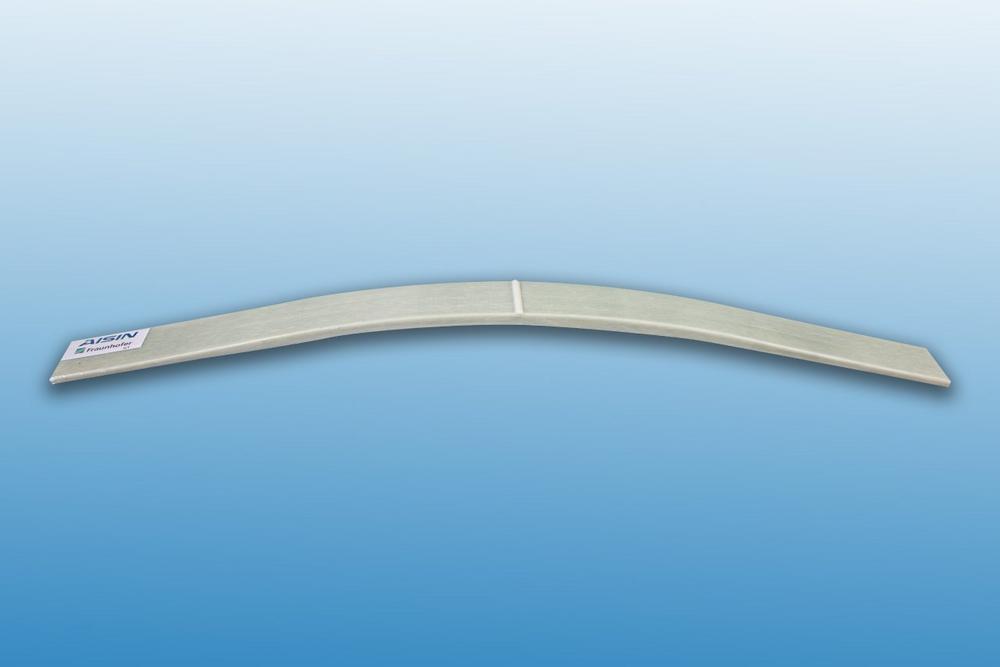In order to reduce costs and use a recyclable material in these applications, Fraunhofer ICT has been researching the thermoplastic variant of the RTM process – so-called thermoplastic resin transfer molding (T-RTM) – for several years. By substituting thermosetting matrix systems with the monomer ε-caprolactam, material costs can be significantly reduced and the recyclability of components can be ensured. In the T-RTM process, the melted ε-caprolactam polymerizes to polyamide 6. Due to the low viscosity of the monomer melt, complex continuous fiber composite structures can be infiltrated quickly and efficiently. So-called in-situ polymerization – to form the component – then takes place in the temperature-controlled mold. For research purposes, Fraunhofer ICT now also owns a high-pressure RTM dosing unit.
The T-RTM process has now been tested for the production of thermoplastic composite leaf springs for automotive applications, as part of a customer project. Until now thermoset matrix systems have been used for the commercial production of composite leaf springs. "We can achieve a significant cost saving by using ε-caprolactam as a matrix system" explains project manager Rainer Wendel. "Three to four kilograms of matrix are needed to produce one leaf spring". The raw material costs of ε-caprolactam are currently around 50% of the costs of an epoxy resin.
Demonstration of complete, high-quality recycling of the component
The component is also fully recyclable after its life cycle due to the thermoplastic matrix. One possibility is the depolymerization of the plastic into its individual chemical building blocks. Alternatively, the component can be shredded, compounded and used as a glass-fiber-reinforced injection molding material. The property profile, material production costs and the energy requirements are decisive factors and will be considered in the next step of the development work.
Significant progress in process engineering
The anionic polymerization of ε-caprolactam to PA6 is very sensitive to moisture. For this reason, according to the current state of the art, the materials to be processed must not come into contact with moisture. Fiber stacks with 20 or more fiber layers usually have to be pre-dried to ensure good chemical conversion of the reactive monomers. The working group of Rainer Wendel has quantified the influence of water and developed a method to compensate for moisture. This renders the T-RTM process based on ε-caprolactam much more robust against external influences, and pre-drying of the semi-finished fiber products is no longer necessary. This was demonstrated in the production of leaf springs, with the successful processing of undried preforms. The result is a further cost advantage through reduced energy consumption and fewer process steps. The manufactured leaf springs are currently being characterized by the customer and tested and evaluated with regard to industrial series application.
Applied research on technical polymers for practical application is the core competence of the Polymer Engineering Department at Fraunhofer ICT in Pfinztal. Close thematic networking within Fraunhofer alliances, excellent international contacts and a colla-boration with the Karlsruhe Institute of Technology KIT enables us to offer our partners system solutions from a single source: from polymer synthesis through to material technology, plastics processing, component development and manufacture, and recycling. The aim is holistic materials and process development for robust, automated and flexible technologies in the light of increasing digitaliza-tion and resource-saving material efficiency. We see ourselves as a link between research and industry, developing innovative solutions for future products. In the field of fiber composites, thermoplastic and thermoset material systems combined with glass, carbon or other fibers and their processing technologies are further developed.
The Fraunhofer-Gesellschaft
The Fraunhofer-Gesellschaft, headquartered in Germany, is the world’s leading applied research organization. With its focus on deve-loping key technologies that are vital for the future and enabling the commercial exploitation of this work by business and industry, Fraunhofer plays a central role in the innovation process. As a pioneer and catalyst for groundbreaking developments and scientific excellence, Fraunhofer helps shape society now and in the future. Founded in 1949, the Fraunhofer-Gesellschaft currently operates 74 institutes and research institutions throughout Germany. The majority of the organization’s 28,000 employees are qualified scientists and engineers, who work with an annual research budget of 2.8 billion euros. Of this sum, 2.3 billion euros is generated through contract research.
Fraunhofer Institut für Chemische Technologie ICT
Joseph-von-Fraunhoferstraße 7
76327 Pfinztal
Telefon: +49 (721) 4640-0
Telefax: +49 (721) 4640-111
http://www.ict.fraunhofer.de
Fraunhofer ICT
Telefon: +49 (721) 4640-710
E-Mail: rainer.wendel@ict.fraunhofer.de
Zentrales Management
Telefon: +49 (721) 4640-392
Fax: +49 (721) 4640-111
E-Mail: stefan.troester@ict.fraunhofer.de
![]()
